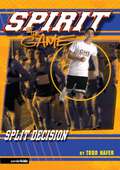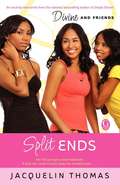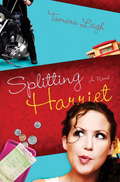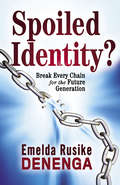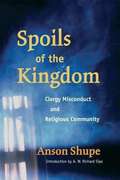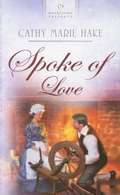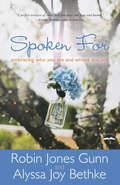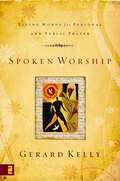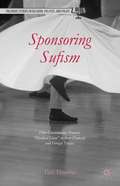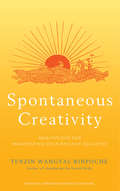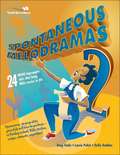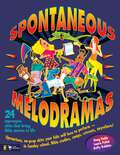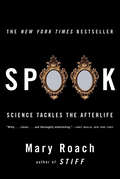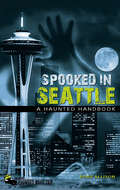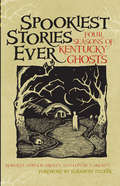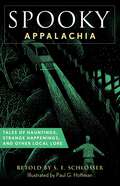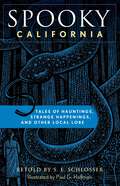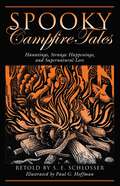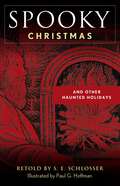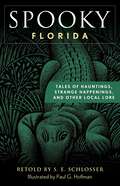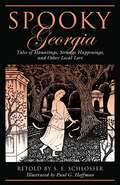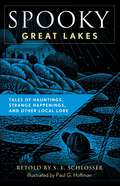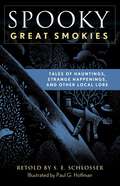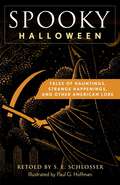- Table View
- List View
Split Decision (The Spirit of the Game, Sports Fiction)
by Todd HaferStand-out efforts on the freshman football and basketball teams have Cody Martin in demand with both the track and baseball coaches. And to complicate matters further, his personal life's a mess since his dad remarried-and now Cody thinks Pork Chop might be using performance-enhancing drugs. When Pork Chop's coach confronts Cody, he is forced to make a tough decision-lie to the coach or risk losing his best friend. What's the right thing to do?
Split Ends
by Jacquelin ThomasDivine AND FRIENDS These girlfriends get through bad hair days together -- and anything else that life in L.A. throws at them! Kylie Sanderson isn't looking for a handout or anyone's charity -- what she needs, as she summons up her courage outside the Crowning Glory Hair Salon, is a job. Tired of moving, currently homeless, she's learned to depend on herself, not her hard-partying and irresponsible mother, which is why she's quit school and is desperate to work. Now, thanks to the salon's owner, Kylie is the shampoo girl at Crowning Glory, and almost overnight her life turns around: she has a place to call home, a future as a stylist, and a dream of one day going to college. And when she meets diva sensation Kara Matthews and spends a luxurious weekend with the superstar's faithful and welcoming family -- including her styling daughter, Divine -- Kylie truly feels like someone should pinch her, because she must be dreaming! Then out of the blue, Kylie's mother turns up with plans to make a fresh start...but is Kylie ready to trust her and forgive the past?
Split Ends: Sometimes the End is Really the Beginning
by Kristin BillerbeckShe's armed--with hot irons, sharp shears, and a flair for color.She's dangerous--truly bad news for bad hair.And she's going to do whatever it takes to make a place for herself in the exclusive Beverly Hills salon.Even if that means sweeping hair, emptying trash, scrubbing dummy heads, and making soy lattes for the stars that come to Yoshi's salon.Even if it means hiding the fact that she's not really an up-and-comer from New York, but a drunk's daughter from small-town Wyoming.Even if it means igoring her attraction to a tall, dark stranger in a fedora who just stepped off the elevator . . . and into her heart.But can a talented hairdresser from the sticks really make it in image-obsessed L.A.? And can she ever find true love and real success in a town that wrote the book on fake?
Splitting Harriet
by Tamara LeighOnce upon a time, I was a rebel. And I have the tattoo to prove it. Then there was the spiked hair-the shade of which changed monthly-"colorful" language that can't be found in your everyday sixteen-count crayon box, a pack-a-day habit, less-than-modest wardrobe, and an obsession with guitar-trashing, drum-bashing music.Did I mention I'm also a preacher's kid? That's right. And like the prodigal son after whom I modeled myself, I finally saw the error of my ways and returned to the fold.Today my life is all about "lead me not into temptation." When I'm not serving as Women's Ministry Director at my father's church, I'm working at Gloria's Morning Café. I even have worthy goals, like saving enough money to buy the café, keep my Jelly Belly habit under control, and to never again hurt the people I love. No more parties. No more unsavory activities. And no more motorcycles! You'd think I was finally on the right track.But since my dad's replacement hired a hotshot church consultant to revive our "dying" church, things aren't working out as planned. And now this "consultant" says I'm in need of a little reviving myself. Just who does this Maddox McCray think he is anyway? With his curly hair that could use a good clipping, tattoo that he makes no attempt to hide, and black leather pants, the man is downright dangerous. In fact, all that's missing is a motorcycle. Or so I thought... But if he thinks he's going to take me for a ride on that 1298cc machine of his, he can think again. Harriet Bisset is a reformed woman, and she's going to stay that way. Even if it kills me!From the Trade Paperback edition.
Spoiled Identity?: Break Every Chain for the Future Generation
by Emelda Rusike DenengaMany people endure lives of quiet desperation— self-imprisoned—and with little hope. There is a way out. In her book Spoiled Identity, Emelda Rusike Denenga is a witness to the truth that with God, nothing is impossible. She has seen cancer, mental illness, and invalidism disappear when the name of Jesus is called upon. Denenga poses important questions like:• In whom do you put your true identity—Jesus or the world? • How can you resist the devil and make him flee? • What spiritual warfare weapons do you have at your disposal? Break the chains that trap you in an unfruitful and discouraging life. Shut the door in the enemy&’s face today.
Spoils of the Kingdom: Clergy Misconduct and Religious Community
by Anson Shupe A. W. SipeIn Spoils of the Kingdom, Anson Shupe investigates clergy misconduct as it has recently unfolded across five faith-based groups. Looking at episodes of abuse in the Roman Catholic, Mormon, African American Protestant, white Evangelical Protestant, and First Nations communities, Spoils of the Kingdom tackles hard questions not only about the sexual abuse of women and children, but also about economic frauds perpetrated by church leaders (including embezzlement, mis-represented missions, and outright theft) as well as cases of excessively authoritarian control of members' health, lifestyles, employment, and politics. Drawing on case evidence, Shupe employs classical and modern social exchange theories to explain the institutional dynamics of clergy misconduct. He argues that there is an implicit contract of reciprocity and compliance between congregants and religious leaders that, when amplified by the charismatic awe often associated with religious authorities, can lead to misconduct.
Spoke of Love
by Cathy Marie HakeThe death of her husband forced Garnet Wheelock to become a mail-order bride. The torturous ship voyage was eclipsed only by the cruelty of her master in the New World of Virginia. But the Lord's hand was upon her, and she has been bought by a new master and given a home. A widower of four years, Samuel Walsh longs for a women's touch upon his home and family. The Widow Wheelock seems perfect for the task - she's industrious and loving, and the children adore her. He's vowed never to marry again, but when news of her pregnancy spawns accusations of impropriety, Sam weds Garnet to preserve his honor. Could their feelings run deeper than mere obligation? Can the Lord weave two broken lives together and create a future stronger than the past that haunts them?
Spoken For
by Robin Jones Gunn Alyssa Joy BethkeSay Yes to the Love Story of Your LifeA great romance was set in motion before you were born. A relentless Lover is pursuing you, and He has made His intentions clear. He wants you to be His forever. How will you respond to the One who longs for you to be His with your whole heart?In Spoken For, Robin Jones Gunn and Alyssa Joy Bethke speak to your heart about what it means for you to belong to Christ, who you are because of His love, and how that affects the way you live. Drawing on biblical promises and their personal experiences, these two friends share what it's like to live out God's unfolding love story.You are not up for grabs. You are spoken for.Includes questions for group discussion and personal reflection.
Spoken Worship
by Gerard KellySpoken worship … is poetry of the soul, reaching out to the soul’s greatest lover. Where deep calls to deep, spoken worship heeds the call. Spoken Worship is written with the conviction that the spoken word has a unique power – power to reach into the heart, power to transport us to where we could not otherwise go and transform us into what we would not otherwise become. The forty poems in this collection go beyond image and emotion. They are created to be not merely read silently but spoken aloud in a way that brings both the speaker and all who listen into a fresh new experience of worship. With performance notes for each of its eight sections that offer insights into the why as well as the how of spoken worship, this book is designed for use in every setting: church services, home groups, personal times with God, hospital rooms – any and every circumstance in which human hearts long to engage with a passionate, deeply loving God who formed us to feel and to respond to him with emotion.
Sponsoring Sufism
by Fait MuediniSponsoring Sufism examines why various governments are looking to sponsor Sufi groups within their countries. While these government initiatives are premised on preventing the rise of violent extremism, this book suggests these governments are also advocating Sufism for other reasons. This includes the misconception that by sponsoring Sufism, the government leaders believe this will further help them stay in power, as Sufis are often perceived to be "apolitical," and thus not a threat to the state. Some leaders, recognizing the level of influence that Sufi masters or sheikhs have in society, have looked to increase their ties with Sufi orders in order to further establish their own religious legitimacy. This is important in some cases, where the biggest political challengers to a number of these governments are non-violent Islamist groups, who use the message of Islam, coupled with extensive social programs, when running in elections.
Spontaneous Creativity: Meditations for Manifesting Your Positive Qualities
by Tenzin Wangyal RinpocheMention creativity, and what comes to mind? For many of us, creativity is the province of someone with a singular gift toiling away in service to his or her art. From this perspective, creativity is a solitary endeavor —the struggle of the individual to express a distinctive vision to the world.But what if we looked at creativity through a wider lens, as a dynamic force that animates us all and connects us with every being on the planet? From this perspective, creativity is not just a spark igniting the fire of inspiration. It is a way of living spontaneously from the sacred space within us that is the source of infinite potential and positive qualities such as love, compassion, and joy. Any voice, any form of expression, that emerges from this core has the power to heal us and benefit others.In Spontaneous Creativity, acclaimed author and meditation master Tenzin Wangyal Rinpoche draws on the ancient wisdom of the Tibetan Bön Buddhist tradition to guide us in developing the ability to show up fully for our lives and express our creative gifts for the greatest good. Guided meditations and practices help us to: meet our own creative nature; recognize and release the "pain identity" that holds us back; awaken the essential creative powers of openness, awareness, inspiration, ripening, and manifesting; and serve others with joy.The teachings of Bön Buddhism have been introducing human beings to their true nature for centuries, and they are as fresh today as ever. Tenzin Rinpoche writes, "My deepest wish is for you to receive great benefit from these teachings as you explore them, take them into your heart, and feel them come alive in your life."
Spontaneous Melodramas 2: 24 More Impromptu Skits That Bring Bible Stories to Life
by Doug Fields Duffy Robbins Laurie PolichThe lights are dim. The crowd is hushed. And a dozen teens start laughing hysterically, piling into a human "boat" that helps set up the mind-blowing miracle of Jesus walking on the stormy Sea of Galilee. Maybe you’re after a booster shot for midweek youth group meetings that feel "same old, same old." Or you’ve just been asked (last minute, of course) to run the service at the shelter during your mission trip, and you need a jolt of energy that’ll draw kids into your lesson. Whatever your creative need, Spontaneous Melodramas 2 will fill the bill. Continuing where its predecessor--Spontaneous Melodramas--left off, this volume offers another two dozen tales from the Old and New Testaments that bring the biblical accounts to life . . . with distinctive, contemporary twists! Although these no-rehearsal skits will leave your students in stitches, the humor never buries the message of Scripture. So you can be confident when bringing your kids--whether or not they’re familiar with the Bible--into sketches like: The Sumptuous Spare Rib (Adam and Eve) Touched by an Angel (Jacob’s wrestling match) Love on a Threshing Floor (Ruth and Boaz) The Wizard of Eyes (Jesus heals the blind man) The Great Pool Party (Healing at the pool) Dead Man Walking (Jesus raises Lazarus) Spontaneous Melodramas 2 is full of flexible skits that youth workers, Sunday school teachers, camp counselors, and retreat directors can use for discussion starters, icebreakers, or talk intros. And they’re natural fits for Bible study programming, all-nighters, mission trips, camps, retreats, parent meetings, and many other events. More than a year’s worth of slapstick, pratfalls, and fun, Spontaneous Melodramas 2 will make the Bible--and its unforgettable characters and adventures--extra memorable for your students.
Spontaneous Melodramas: 24 Impromptu Skits That Bring Bible Stories to Life
by Doug Fields Duffy Robbins Laurie PolichYou know them as hilarious, boisterous skits that get kids involved, whether they're hamming up front, or in the audience cheering for the good guys, hissing the bad guys, and getting nearly as animated as the onstage actors. Better yet, these no-rehearsal skits are comic takes on 24 classic Bible stories, from Babel to Zacchaeus. Use these skits to take your students into or out of your Bible lesson -- for the humor never buries the central message of the Bible passage. Inside you'll find 12 Old Testament and 12 New Testament stories -- like these: - The First Tongue Twister (the Tower of Babel) - Josephine's Dream (Joseph and his brothers) - The Young and the Hairless (Samson and Delilah) - Dave, the Wave, and the Giant Kahuna (David and Goliath) - Dances with Lions (Daniel) - World Serious: The Empire Strikes Out (the temptation of Jesus) - Good Sam, the Levis, and Judas Priest (parable of the Good Samaritan) - Showdown at Tombstone (Jesus and the demon-possessed man) Unchurched teenagers who can't tell Samson from Solomon, or long-time youth group kids -- everyone will love not merely hearing or reading Bible stories, but doing them. Welcome to more than a year's worth of slapstick, pratfalls, and melodrama. These Bible-story skits are anything but solemn, but they'll make Bible stories memorable for your students.
Spook: Science Tackles the Afterlife
by Mary RoachThe best-selling author of Stiff and Bonk trains her considerable wit and curiosity on the human soul. "What happens when we die? Does the light just go out and that's that—the million-year nap? Or will some part of my personality, my me-ness persist? What will that feel like? What will I do all day? Is there a place to plug in my lap-top?" In an attempt to find out, Mary Roach brings her tireless curiosity to bear on an array of contemporary and historical soul-searchers: scientists, schemers, engineers, mediums, all trying to prove (or disprove) that life goes on after we die.
Spooked in Seattle
by Ross AllisonSeattle may not be as old as some would expect from a haunted city. But it has a large number of haunted sites and stories. Spooked in Seattle will lead readers on a journey through Seattle's neighborhoods and reveal the city's public locations, history, and tales of strange encounters. For those who love to venture off into corners in search of ghosts and the unknown, this book will set readers forth in the right direction.Spooked in Seattle features more than 150 haunted locations, historic and contemporary photos, top ten questions about ghosts, Seattle's top ten most haunted places, location maps and addresses, Seattle history and haunted facts, Seattle cemeteries and tombstone symbols, and more.Spooked in Seattle presents many locations throughout the city that are believed to be haunted, claim to have ghosts, or have undergone investigation. All of these stories are broken down into sections based on the city's neighborhoods with corresponding addresses to make finding them easier for the ghost enthusiasts. Maps and photos help bring to life the locations, making the Seattle ghosthunting experience easy and enjoyable.
Spookiest Stories Ever: Four Seasons of Kentucky Ghosts
by Roberta Simpson Brown Lonnie E. BrownA collection of haunting tales set among the landscapes and landmarks of the Bluegrass State.Tree branches scratching at your window on a stormy April night . . . The hot, sticky oppression of a stifling summer&’s day . . . November leaves rustling as a chill sneaks into your bones . . . The darkened days of winter . . . No matter what the season, it&’s always a good time for a ghost story.From masterful storytelling duo Roberta and Lonnie Brown comes Spookiest Stories Ever: Four Seasons of Kentucky Ghosts, a creepy collection of tales from their home state. Featuring familiar Kentucky landmarks such as the Palace Theater and the Waverly Hills Sanatorium in Louisville and Shaker Village of Pleasant Hill, these accounts from across the commonwealth are sure to put a tingle in the reader&’s spine.These notable stories, including tales of the &“chime child&” who can see and talk to ghosts, graveside appearances, and the Spurlington Witch of Taylor County, occur in all four seasons and come from every corner of Kentucky. An essential part of the American storytelling tradition, these ghost stories will delight those who love getting goose bumps all year long.
Spooky Appalachia: Tales of Hauntings, Strange Happenings, and Other Local Lore (Spooky)
by S. E. SchlosserPull up a chair or gather 'round the campfire and get ready for creepy tales of ghostly hauntings, eerie happenings, and other strange occurrences from times past! Appalachia folklore traditions are kept alive in these expert retellings by master storyteller S.E. Schlosser and through artist Paul G. Hoffman's evocative illustrations. You'll meet ghosts and witches, hear things that go bump in the night, and feel an icy wind on the back of your neck on a warm summer evening. The stories in this entertaining and compelling collection will have you looking over your shoulder again and again.
Spooky California: Tales Of Hauntings, Strange Happenings, And Other Local Lore (Spooky)
by S. E. SchlosserPull up a chair or gather round the campfire and get ready for thirty creepy tales of ghostly hauntings, eerie happenings, and other strange occurrences in California. Set in the Golden State's big cities, oceanside towns, rugged mountains, and sparsely populated deserts, the stories in this entertaining and compelling collection will have readers looking over their shoulders again and again.California's folklore is kept alive in these expert retellings by master storyteller S. E. Schlosser and in artist Paul Hoffman's evocative illustrations. Readers will meet the Queen of Death Valley, cheer on the ghost who haunts his claim-jumping murderer, look out for a blood-hungry rolling head, learn about the sea monster of Monterey Bay Canyon, and hear otherworldly voices from the Pacific Ocean--or simply feel an icy wind on the back of their necks on a warm California evening. Whether read around the campfire on a dark and stormy night or from the backseat of the family van on the way to grandma's, this is a collection to treasure.
Spooky Campfire Tales: Hauntings, Strange Happenings, And Supernatural Lore (Spooky)
by S. E. SchlosserNew from the team that has brought us Spooky New England and other Spooky titles are thirty classic creepy tales of ghostly hauntings, eerie happenings, and other strange occurences. Expert storytelling and evocative illustrations once again prove perfect for reading aloud or retelling later. Whether gathered around the campfire or read on a dark and stormy night, these tales will stay with you long after you close the book's covers.
Spooky Christmas: And Other Haunted Holidays (Spooky)
by S. E. SchlosserGrab an eggnog, gather &’round the fireplace and get ready for twenty-five creepy tales of ghostly hauntings, eerie happenings, and other strange holiday occurrences from times past! Holiday folklore traditions from around the United States are kept alive in these expert retellings by master storyteller S. E. Schlosser and through artist Paul G. Hoffman&’s evocative illustrations. Ghosts, vampires, werewolves, and witches populate the pages of this compelling holiday collection. From Hanukkah and Christmas to Three Kings Day and New Year's, these spooky stories will have you looking over your shoulder again and again.
Spooky Florida: Tales of Hauntings, Strange Happenings, and Other Local Lore (Spooky)
by S. E. SchlosserTales of hauntings, strange happenings and other local lore throughout the Sunshine state!
Spooky Georgia: Tales of Hauntings, Strange Happenings, and Other Local Lore (Spooky)
by S. E. Schlosser Paul G. HoffmanPull up a chair or gather round the campfire and get ready for creepy tales of ghostly hauntings, eerie happenings, and other strange occurrences in the Peach State. Whether read around the campfire on a dark and stormy night or from the backseat of the family van on the way to grandma's, this is a collection to treasure.
Spooky Great Lakes: Tales of Hauntings, Strange Happenings, and Other Local Lore (Spooky)
by S. E. SchlosserPull up a chair or gather 'round the campfire and get ready for creepy tales of ghostly hauntings, eerie happenings, and other strange occurrences from times past! Great Lakes folklore traditions are kept alive in these expert retellings by master storyteller S.E. Schlosser and through artist Paul G. Hoffman's evocative illustrations. You'll meet ghosts and witches, hear things that go bump in the night, and feel an icy wind on the back of your neck on a warm summer evening. The stories in this entertaining and compelling collection will have you looking over your shoulder again and again.
Spooky Great Smokies: Tales of Hauntings, Strange Happenings, and Other Local Lore (Spooky)
by S. E. SchlosserThe eastern side of the Smokies abounds with spooky tales, like the story of a Shadow Woman who appeared to a farmer each morning and evening to beg for a cup of milk. Skinned Tom is another East Tennessee haunt, though his is a sinister tale that warns the unfaithful to steer clear of local lover&’s lanes for their illicit trysting. From the farmer who finds a Cavern of Skulls to a moonshiner who makes a deal with a water demon; and the Half Shaved ghost seeking vengeance to the first (and only) meeting of the Asheville Ghost Club, the Great Smoky Mountains and its foothills abound with spooky tales. My favorites are in this collection.
Spooky Halloween: Tales of Hauntings, Strange Happenings, and Other American Lore (Spooky)
by S. E. SchlosserGrab some candy corn, gather 'round the fireplace and get ready for twenty creepy tales of ghostly hauntings, eerie happenings, and other strange occurrences from times past! Halloween folklore traditions from around the United States are kept alive in these expert retellings by master storyteller S. E. Schlosser and through artist Paul G. Hoffman&’s evocative illustrations. Ghosts, witches, black cats, and jack o' lanterns populate the pages of this of this spooky holiday collection. From Halloween and Samhain to Dia de los Muertos, these spooky stories will have you looking over your shoulder again and again.
